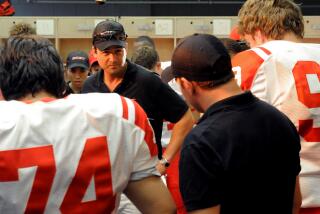Fitzgerald on Fast-Forward : THE FINAL CLUB <i> by Geoffrey Wolff (Alfred A. Knopf: $19.95; 371 pp.) </i>
- Share via
The rich were different from him and us, F. Scott Fitzgerald announced in youthful dazzlement and older dismay. He wasn’t the first to notice that Huck Finn’s raft was partitioned first-class and steerage; and that the American dream of equality differed vastly according to whether you dreamed it in silk pajamas or skivvies. But he was the first to say it so memorably that it became part of our literary imagination.
Fitzgerald fell in early love with the difference. It was golden to him, even apart from the money. The gold turned to steel in “The Great Gatsby.” When he discovered the lethal selfishness that went with the grace, he transcended his infatuation without relinquishing it. He burst his cherished bubble and burst with it. Hemingway wrote patronizingly that it destroyed Fitzgerald; in fact, it elevated him.
Poor Scott . . . Great Scott. Geoffrey Wolff’s novel, set in Fitzgerald’s Princeton 40 years later, and haunted by his theme, weaves between the two notions. At the very end, it attempts to go beyond them.
It tells of Nathaniel Clay, the half-Jewish scion of a Seattle merchant family, who comes East in the 1950s to be seduced and repelled, wooed and snubbed by the members of the Princeton smart set. Years later, after a chunk of his life has been destroyed by them, he will come to complicated terms. Their allure will be seen as mediocre and--a step past Fitzgerald--the mediocrity will be seen as one more shortfall in a common humanity.
“The Final Club” is an odd enterprise. For Wolff, who went from Los Angeles to Princeton in the ‘50s, Fitzgerald is a master and a challenge. Class in America, the richness and poverty of the elite, and discrimination in its good and evil sense--what is the relation between discriminating among ideas and discriminating among people?--are themes that he set out to develop further.
The result is choppy. More than a novel, the book reads like a series of stories and fictional sketches about a small group of people over several decades. They are awkwardly joined, with discontinuities of character that are not just a matter of time passing, and they vary from brilliant to turgid.
At times, “The Final Club” is close to a pastiche of “Gatsby” and “The Far Side of Paradise”; at times, it seems like an uncertain sequel. At other times, it is a rich and beautifully observed exploration of similar themes brought up to date.
Yet Wolff’s up-to-date tends to be only halfway up. His passion and insight engage more effectively with the 1950s than with the decades since. The most compelling and entrancing portion of the book deals with Nathaniel’s last three college years. In the succeeding sections--the book’s second half--the insight turns wordy and loses its distinctiveness; the narrative loses its life.
There are other time problems. In an effort to forge a link between Fitzgerald’s glitterers and Nathaniel and his contemporaries, Wolff’s tone wavers. Diana, a snobbish Eastern sex-tease whom Nathaniel falls for, has a flat, flapper quality that seems anachronistic in the ‘50s and ‘60s. As a freshman, Nathaniel’s letters home are naive, as they are meant to be; the naivete and the language suggest the ‘20s. By the time he is a junior, he has fast-forwarded not two years, but 30.
Before the middle sections, the book has had some strong passages as well as some uncertain ones. There is the brilliant initial scene: a confrontation between Nathaniel’s dissolute playboy father and his mother, who is on the point of a mental breakdown. She pulls her son out of bed one night, brandishes a pistol and demands that he decide whether she is to shoot the father or herself. Nathaniel begs off on the grounds that he has a high school chemistry test and needs his sleep.
The portrait of Nathaniel’s maternal grandfather, the kind and cultivated owner of a Seattle department store, is loving and shrewd. He and his wife become the boy’s guardians, in effect, after his mother collapses and his father dies in a drunken mishap. In contrast, the father’s cold, Waspy family--they do not forgive Nathaniel his Jewish mother--is a caricature. The early college scenes, and a society dance in New York--which Nathaniel is persuaded to crash by his aristocratic roommates, and where he is humiliated--have a febrile, scattered tone. They are Fitzgeraldry unevenly assimilated.
The strength and pleasure of “The Final Club” lie in the two central sections entitled “Bicker” and “Boys Without Women.” Complex, deceptively effortless, they dramatize Wolff’s subject far better than anything that goes before or follows.
Princeton’s Bicker is a few days when everything stops so that the members of the eating-clubs--the equivalent of fraternities or secret societies--can visit the members of the sophomore class and decide whether to admit them. By the ‘50s, it had eased itself into a system far more inclusive, yet oddly more painful, than anything at Harvard or Yale.
At Princeton, instead of excluding almost everyone--hence, a mild spread-out trauma--almost everyone was admitted, somewhere. Yet every sophomore would spend those days in his room, dressed up, to be examined by delegation after supercilious delegation. For those who got no acceptance at all, it could be devastating, but even for the great majority, who might find themselves rejected by the clubs they most hoped for, there was some feeling of rejection.
Nathaniel is supported by his roommates, Booth and Pownall. Both have the highest social credentials; both are shoo-ins for Ivy, the oldest and perhaps poshest of the clubs. Such is their solidarity with their roommate that they present themselves as a trio. Even so, Nathaniel is rejected until a last-minute bit of politicking wins him grudging entry.
Wolff makes fierce and subtle social comedy of the Bicker visits, the questioning, the put-downs. Nathaniel is rejected by one club when he admits using wire coat-hangers. Even better, and perhaps the heart of the book, is the friendship of the three roommates. Wolff doesn’t make it clear just why the friendship began, but he turns it into something vivid and moving, though with a certain acrid undertone.
Pownall is eccentric, laid-back and kind. He is also an alcoholic who will later go to pieces. Booth, a dandy and a wit, is super-rich and super-aristocratic, a veritable duke’s son. There is something fierce and passionate in his championing of Nathaniel. Wolff writes an extraordinary scene in which Booth gets his roommate to accept his second-class acceptance by pouring contempt on the other Ivy members, and telling him that their friendship is what matters.
Booth’s affection is genuine. It also is a supreme arrogance. Because of who he is, he will transform Nathaniel into an aristocrat. He can’t, of course; Nathaniel undergoes all kinds of pain and rejection by the circle that Booth has drafted him into. As in “Gatsby,” the rich wound even by their favors. Only by rowing on the varsity crew--Wolff writes terrificly well about it--can he win a genuine acceptance, though of a different order. And it is in rowing that Nathaniel sees his two friends, and fellow crewmen, lose their luster. Pownall weakens from alcoholic thirst, Booth from a lack of moral hunger. The rich are different--they decay faster.
Woven into this account is another: a portrait of Hyde, a fiery English professor. Wolff’s rendering of his sardonic and passionate instruction is another of the book’s best parts. Hyde represents discrimination of the “good” kind, the kind that Princeton exists to impart: the teaching of excellence. And Nathaniel glories in it, not connecting it to “the coarse procedure that had weeded him the year before.”
Later, he will. “Final Club” goes on to describe what happens in the next decades. Pownall, after years of drunken rot, manages a shaky, low-energy recovery. Booth relapses into hobbies and boredom, until, in another turn, he grows a ponytail and becomes a paramedic in a poverty program. Nathaniel is a partly successful and partly disappointed writer and journalist; he has a partly successful and partly disappointing marriage. The golden and fearsome hierarchies dissolve into everyday tracklessness, until they are briefly revived in a tragic incident involving Booth’s and Nathaniel’s children, all three of whom are at Princeton.
There are good moments in this second half, but the light has largely left the writing. It grows forced and talky, and the talk is often muddy. What remains is the middle. If Fitzgerald has been the inspiration for it, it is by no means the smallest of his achievements.
More to Read
Sign up for our Book Club newsletter
Get the latest news, events and more from the Los Angeles Times Book Club, and help us get L.A. reading and talking.
You may occasionally receive promotional content from the Los Angeles Times.










